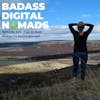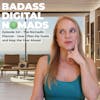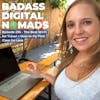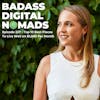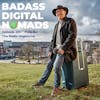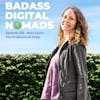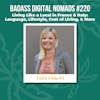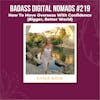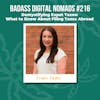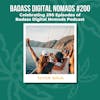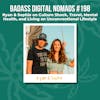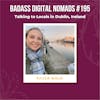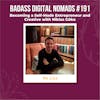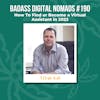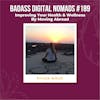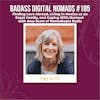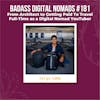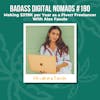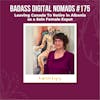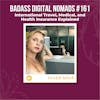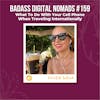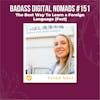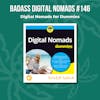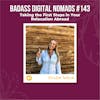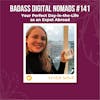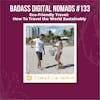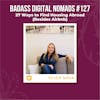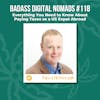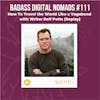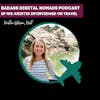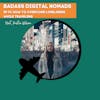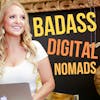Overcoming Reverse Culture Shock and Remote Work Burnout as an Expat and Digital Nomad
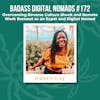
Charlotte Gray traded her corporate job and commute for an idyllic lifestyle as an expat in The Netherlands, working for Mercedes Benz. However, when she moved back home to London during the pandemic, she struggled to cope with reverse culture shock and work-from-home burnout.
Charlotte Gray traded her corporate job and commute for an idyllic lifestyle as an expat in The Netherlands, working for Mercedes Benz. However, when she moved back home to London during the pandemic, she struggled to cope with reverse culture shock and work-from-home burnout. That's when she decided to move to Barbados, apply for a remote job with SafetyWing, and never look back.
If you’ve ever felt like you had to be "responsible" by postponing your travel plans and waiting to live life on your own terms, this episode is for you.
At the end of this episode, Charlotte also offers incredibly valuable advice on how to find a remote job or transition into freelancing or working for yourself online.
Episode 172 Special Offers:
EPISODE 172 TOPICS:
- Experiencing reverse culture shock
- Moving abroad to be near nice people
- What it’s like living in Maastricht in The Netherlands
- Pressure from family and society to follow a normal path
- Tips for finding your first remote job
- How to transition from a traditional job to working for yourself
- Increasing your income from remote work to match your traditional salary
- Taking the leap to becoming a digital nomad
- How SafetyWing will change the world with their mission that aims to revolutionize the way you travel and live overseas: educating, inspiring, protecting, and making the world a better place “working here doesn’t feel like work.”
- Mental health and wellness
- The cost of living in Barbados
- Saving money to travel
- How to find balance while working remotely - switching off and avoiding burnout (even if you’re a “people pleaser”)
RESOURCES
Related Podcasts:
- Building the First Country on the Internet with the SafetyWing Co-Founder
- Career Rehab: How to Find Remote Jobs with Kanika Tolver
- How to Find Remote Jobs on FlexJobs
- Overcoming Remote Work Burnout
- What Is Async? A Conversation with the Founder of Running Remote
Destinations In This Episode:
- Barbados
- London
- Maastrict, NL
- Portugal
Connect with Charlotte:
Connect with Kristin:
- Follow on Instagram
- Subscribe to Traveling with Kristin on YouTube
- Subscribe to Digital Nomad TV on YouTube
- Join the Badass Digital Nomads Facebook Group
...........................................................................................
Support the Badass Digital Nomads Podcast:
- Buy Kristin a Coffee
- Become a Patron
- Leave a 5-Star Review
- Buy Official Merch
- www.badassdigitalnomads.com
...........................................................................................
A special thank you to Kristin's patrons and welcome, Frankie!
Become a Patron for $5/month at Patreon.com/travelingwithkristin
...........................................................................................
Podcast descriptions may contain affiliate links of products and services we use and recommend at no additional cost to you.
Safety Wing
Have you ever felt confused or overwhelmed with all the different travel insurance options out there? If so, look no further, Safety Wing Nomad Insurance is a flexible travel medical insurance plan that covers you if you need medical assistance while outside your home country. You can get a short term policy for just a few days or a week or pay month to month - just like a subscription. Already traveling? No problem. You can sign up for coverage from home or abroad. It's fast, easy and affordable. Just a few minutes ago, I purchased a policy for my upcoming trip to Portugal and it took less than 3 minutes. The cost for my two and a half month trip was only $189. Sign up for a plan today at SafetyWing.com or by using the link in the show notes. Visits back to your home country are also covered.
Introduction: Welcome to Badass Digital Nomads, where we're pushing the boundaries of remote work and travel, all while staying grounded with a little bit of old school philosophy, self-development and business advice from our guests.
Kristin Wilson, Host: Hey there, Kristin, from Traveling with Kristin here and welcome to episode 172 of Badass Digital Nomads. My guest today is the lovely Charlotte Gray from the U.K. That rhymes!
And we have an action packed and super valuable and insightful conversation for you today. Charlotte talks with us about her transition from the 9 to 5 corporate work grind in London, England, and becoming an expat working for Mercedes in the Netherlands. It was really interesting to talk with her because you get this perspective of going from the corporate life in your home country to the corporate life in a foreign country. Then the reverse culture shock of going back to your home country before realizing: you know what, this is not for me. I really want to work remotely and travel and live a different lifestyle. And so then she transitioned to getting a remote job, traveling to Barbados and around the world, and then ultimately finding her current role at Safety Wing.
She gives a ton of super useful, valuable tips on finding a remote job and the advice that she's given to her friends who have seen her lifestyle and they're like, "Hey, Charlotte, how can I do the same thing?" But she also talks about some of the dark side of the location independent lifestyle, and some of the things that she's struggled with while working remotely and traveling.
Her struggles with mental health and finding community. So we get some tips on that, too. I took a ton of notes in this episode and also wrote down a lot to include in the show notes. So check those out for links to all of the resources we talked about today and enjoy my conversation with Charlotte Gray.
Podcast Interview:
Kristin Wilson: Welcome Charlotte to Badass Digital Nomads - so great to see your smiling face today and where are you joining us from?
Charlotte Gray: I'm joining you from Maastricht in The Netherlands. I want to say thank you so much for having me. I'm very happy to be here.
KW: Lovely. So I saw on your website that you had lived in The Netherlands previously, but you were also doing some traveling around the world. So how did you end up back in the Netherlands? Because I know that you quit your job in the UK, went to the Netherlands, started your blog, traveled, and so somehow you've ended up back in the Netherlands. Fill us in. How did this all happen?
CG: Definitely so. It's actually quite poetic that I'm back in the place where my Working Abroad blog really began. So I grew up in London, and I got the opportunity to come and work in Maastricht in social media back in 2016, and I took it in. It was a contract for a year. I was very, very nervous because I didn't know anybody in the Netherlands. I didn't speak any Dutch. I didn't even know anything about the Netherlands. But I was like, okay, I never really travel during uni. I've done some family trips and that I was very lucky to do - to our home country of Jamaica, but I've not seen that much of Europe so hey, why not? To get paid and see a new place?
Well, I ended up loving it so much that I stayed for two years and I made the most incredible friends that I've had ever since I started. So I'm back now. I haven't left since 2018. So I'm back - like four years later, visiting the friends that I made here originally, now as a baby, digital nomads working remotely. And I couldn't be happier. I'm just passing through. Next up was Portugal, then back to London before going on to a few other places. So I'm just passing through.
Oh, amazing. So how long will you be staying there?
Just until five days. I got here last Friday and today is Tuesday. I will say time is more difficult now since the pandemic. It's never really know what day it is working across all these time zones. I live and die by my calendar for sure. So it's a meeting on Thursday and we get in the train to Brussels to fly to Portugal, where I'll meet another friend who I made working here in Maastricht.
Oh, nice. And then, do you know how long you'll be in Portugal for?
Yes, just like nearly two weeks before flying back home. So we're going to travel around Portugal and I've never been before, so I'm super excited to go. We're going to head to Porto and then Gaia Center and Lisbon, and then I'm going to go back to London.
Nice. Well, I was going to say, might see you because I'm planning on going to the Netherlands. No way, but I think I'll be there after you. So it would be like October and then go to Portugal after that. But maybe I'll be there through the end of the year. But then I might go to London because my cousin is having a baby in London.
So we'll see we'll stay in touch then. Maybe we can cross paths.
I would love that. I would really love that.
So what is Maastricht like? Because I have spent a lot of time and mostly only in Amsterdam, like Amsterdam and Rotterdam, I haven't really seen the rest of the country. But what did you what do you like about it? What's the lifestyle and the vibe like?
Oh, my gosh, that is such a great question because honestly, since I've got back, I haven't stopped being and sending pictures to everyone on WhatsApp. I'm constantly walking around with my phone, filming everything, everything. I'm a tourist. I'm behaving like a tourist. It's a wonderful vibe down here. So it's a student town and they've got Maastricht university. And so you get people from all over Europe - all over the world, come to study here.
So it's just like really vibrant, it's lively, but at the same time it's really quite peaceful. So it has a lot of the great elements of Amsterdam. It even has the architecture, the canals, the bicycle, of course. But then it's, it's a bit more quiet in certain areas and then, it also got the great nightlife as well. So it's kind of like you get a little bit of everything here and it's just so clean. Everyone so friendly, everyone smiling all the time. I've been a bit self-conscious and like, are they laughing at me because I'm talking to myself, walking around with my phone. But no, like, people are just genuinely happy because it's such a pleasant place with the cute boutiques and restaurants, the ones being alfresco, drinking wine.
It's just honestly a really picturesque, beautiful, beautiful place like rain or shine. Snow even cycled in the snow like any temperature anywhere, though. It's just a really wonderful place. I definitely recommend that it is a bit of a trek to get to from Amsterdam. It's a two and a half hour train because it's right in the south south, south, south of the Netherlands. It borders Belgium and Germany, so it's definitely worth the excursion, I would say is a little gem of a place.
That is what I've heard that pretty much echoes exactly what my best friends have said about it.
Really?
There's a lot of foreign students, but do you see many tourists there or do you feel like it's really a local area?
I think it's interesting because of course, the experience that I had was kind of a foreign experience because I came over from the UK, I was working at the Mercedes-Benz, which is full of people from all over Europe. So I kind of had that for the student, I guess, experience. But what I would say is you definitely have a lot of locals here and the residents and the visitors and the tourists, they all do though you definitely get is much more busy on the weekends with people visiting from out of town.
Andre comes down from his castle every year to come and play concerts and that brings loads, loads of people to town. But I would say the mix is quite harmonious. So we definitely are getting locals. We also - anywhere near has such an incredible story. Like a lot of people that live there, not from here, and they've made it their home and that's really nice too.
Oh, I'll definitely have to check it out. And how did you end up getting assigned to go there? Was it an opening that came up in your company or did you ask them if you could work abroad?
Oh, no, not at all. I wish. So, back or put myself back there. So I was like one year out of uni. I did an internship at a creative agency in London and that was like my first job. I got through an amazing organization called Creative Access that helps people of color get their first steps into the creative industry and after I departed, then it was a bit of a frenzy. I was looking for the next position and it was a tough jobs crowd and I was just applying everywhere and one of the places that I got bit was Mercedes over here in Maastricht and it was definitely - was not something I expected. It wasn't necessarily anything I planned. I debated whether to go or not to go for a really long time. I actually went back to visit the office today. So I've just come from to see boss of my own team. And my biggest concern coming here was that I wouldn't make any friends. I was really nervous that I wouldn't fit in and that I'd be such an odd bod. But yeah, I took the findings and honestly it was the best thing I ever did is that it was amazing and I stayed for two years and I kind of left to go home but with the - I guess with the heart that I wanted to work abroad again, I didn't know how I was going to do it at that stage. No, I heard murmurs of laptop lifestyles on Instagram, but I figured that was just for software engineers and web designers, and I didn't know how it could be possible for me, but it was something that I knew I wanted to do. So it's crazy now that it's come full circle that I'm back here visiting and I am working remotely, I'm so happy.
Yeah, there's definitely a misconception at first that to work remotely you have to be some kind of tech whiz or like a tech bro with a backpack. But I've been trying to show that there's people from everywhere and all different backgrounds that that can do it in all different ages. So I want to talk with you a bit about that, like how you got your first remote job. But first, I'm curious of how you found the Dutch work culture, like coming from a 9 to 5 in the UK. Were you in London? And then was it like in, you know, transitioning to the corporate world in the Netherlands?
Oh, that's really interesting because, I wasn't long out of university, I guess it is kind of the way we began. It didn't feel that different to kind of starting a school. Since I started with the cohort of about 60 other hires and we were all staying and they put us up to stay in a hotel for the first six weeks of us being like and then, you know, a lot of people were coming from all over. They needed a chance to find accommodation. So it was kind of felt like a course of residence in a way. So you were going to work 9 to 5, but then also trying to sort out somewhere to live in the evenings. So the actual work, the training, that process didn't feel that dissimilar to just the regular kind of corporate job. It was clear that it was tech work very seriously. Sick days were not really something -that was a thing where you signed up to work and kind of rain or shine or snow. But that also wasn't a deterrent for me because I really enjoyed the job and I really enjoyed the people I worked with. So it honestly was a pleasure to come to work every day and gain something that because on display it was quite a cool, cool place to be when you bumped into in the hallway was really friendly because everyone's in the same position and they wanted to make friends. So I guess it was quite a unique experience working at that company, maybe a different company would be, you know, maybe a bit stricter or maybe like a real shock to the system. But this one in particular, it just felt like a really friendly kind of family place to be. So it was just what I needed, kind of nurturing as someone who would kind of completely displace themselves from everyone and everything that they knew.
How did you - what was the day like there? Was it really strict, like 9 to 5 or 9 to 6? Because I remember working in co-working spaces in the Netherlands and everyone really got there and started working at 9 a.m. and left by five or six. And then as a group, even though we all were working for ourselves or working for different companies, everyone took lunch from 12 to 1. It was like very regimented and everyone shared food and we would just have this. Just. Sandwich stuff. They love us sandwiches, they're so good. And cheese and Nutella and like all of the like sugary. Like. Spreads, like the cookie butter spread and stuff and we and we'd have vegetables and stuff too. But we have like this spread of food across the table in the middle of the coworking space. And everyone's just like grabbing over each other and talking and like making sandwiches. And then it was like at 1 p.m., everyone was back to work.
You know, that was very nice. They knew that you had that experience. And it it is reminiscent of the times that we had here. So I work in the social media world, so I think that was quite different to the regular 9 to 5 in that we had to have like a whole day coverage. So from 8:30 to 9 p.m., there were two shifts of people that would come in. And so like the early shift and the late shift to make sure that we were representing Mercedes across all of the social media channels between those hours of the day. So people who had queries, complaints, just wanted to shout about how much they loved the company so that they could get a response in a timely fashion. So yeah, it was striking that you know, you needed to be at your desk ready to go, starting to answer those messages at 830. And yeah, a lot of people had been very seriously about five like not a minute longer, they would be out the door. It was regimented in that you had to kind of tell people when you were going to lunch to make sure there was always coverage on the channels of your language. So you did need to kind of coordinate with the other people within your kind of region team. So with me, the other UK people with others, the Italian people, the Spanish people, you have to check in with each of us to say, okay, I'm going to take a break, I'm going to go to lunch. You can't all go at the same time. But because all of the teams did interact and we have this socials and it's called Fof, which is like five on Fridays, everyone would come and have a drink so you had friends in other teams, so then you can coordinate your lunch breaks with your friends and then we'll meet in the canteen where you might have brought your own food, or they also cooked food that you could purchase at a discount and then, you know, break bread together for your 30 minutes or 45 minutes or whatever you were allotted, depending on what's here. And then, yeah, you go back to your desk and you get on with it for the rest of the day. It became quite normal for me. I didn't know anything. I didn't really know anything any different because it was only my second job, so I didn't really think anything of it. In my first job, I did have an hour lunch break so I was like, Cool, this is 30 minutes. How am I going to eat lunch in 30 minutes? You got good at it.
Oh yeah. They're really efficient. Like they when they're working, they're working. But then when they clock off, they're like happy hour everyday.
Maybe it sounds bad. Like most days of the workday, you get on your bicycle and you're like, Okay, where are we going for wine? I’d go cycling, pick some wine from market and we like where we sit today and then spend the evening kind of whiling it away, which was really special when you meet coming from London and working with I used to work in Oxford Circus where, you know, the minute you finish work, you you run out of the office, going to get on the tube and you go straight home.
You don't talk to anyone. You think you've got your blinders on. So it was definitely such a refreshing experience to then go with your coworkers that eventually then become your friends and spend time with them in the evening. And so you're like, okay, I guess I should go to bed because we've got to get to work tomorrow. See you again. See you again in the morning.
Yeah. I would imagine that your commute in London, it was much longer compared to your commute in Maastricht. Like you could just ride your bike home.
So much longer and so much more hectic. So whilst I've been here, I rented a bicycle and it was the joy, the joy I feel cycling around the town. It's so nice. Yeah, I'm in London. I got not to long a try. I had quite a lucky commute. 30 minutes, 45 minutes into London. But, you know, you're just sandwiched in there like sardines. You're standing underneath someone's armpit. Men are pushing you down to sit down in front of you. Chivalry is dead.
So that means equal opportunity for you but I'm not saying let me do things because I'm a woman, but I'm like, come on, God. don’t push me out of the way to get on the train before me. But that seems rude.
Well, yeah. Been there.
You know what that's like?
Yeah. In those tube newspapers, like, everyone has those daily features, like the gossip and metro, their elbows on your face. It’s funny though. I like the part where they have. It's like the secret admirer section. The rush hour crash is my absolute favorite section. So I was like, I wonder if I've stayed here long enough, if I could see myself in the crush section. I feel like that's what we all dream off. We're all reading that section, looking for ourselves like we all want that. You never known anybody who has, like, made it. Do you know anyone who's ever been in there?
No, no. But then you probably wouldn't want to know who actually wrote it. Maybe someone who's not a good match for you.
I always think about the ones like when you read one you like all that's a little bit. I don't know if that cute or is that creepy. I think about a person who that's about. Some of them are creep.
A line or sometimes get cross. I wonder if the person that is about ever then like changes their commute. So then whoever it was that wrote about them. So it's like it's a double edged sword. Good point. So for people who don't know what we're talking about. So there's this a daily free like newspaper, little tabloid news thing in London in the tube stations. And there's a section that's kind of like, I guess like classifieds, like rush rush hour crushes secret admirers. And people can be likened: To the girl who leaves from such and such station this time and blah, blah, blah. And then they'll write like a message to you. So people who see you on the tube every day, but they've never talk to you. And yeah, so it could get it's cute and creepy at the same time.
A 100%.
So why your life, in Mercedes, you know working for Mercedes - living in Maastricht like everything sounds good. The joy and elation of riding your bike every day. I can totally relate, like one of my favorite things to do in the entire world. Why did you leave that job?
That is a good question. And since I've been here, I have been asking myself, why? Why did I leave this job? and I think the answer is it was definitely kind of just societal pressures kind of thing back when. So when I was here, I moved here at 24, so I left at 26. And a lot of my coworkers and social media and my colleagues in general, like everyone, was all beat up. They all had partners. They were waiting for like, you know, their partner to finish this program. So then they could leave together. They were waiting for them to get married. So then they could go here together. Like, what are you what are you waiting for? Like, I hadn't found, you know, any concrete. Person of interest. Yes, I hadn't found it. Really? Any people of interest? Some people of interest, but nothing, I guess, serious. Nothing that was necessarily worth investing in. So I kind of had some voices from my family at home that kind of like what you do in, you know, you need to come home, you need to be serious, you need to settle down and, you know, buy a house flat. Those were, you know, traditional values that my family members have for me. But definitely out of a good place. Don't get me wrong, those are the things I also wanted for myself. So there were 30 looming at that age and at that time, you know, it was the most terrifying thing to me ever. I was like, I can't get to 30 and not have, you know, be married or not be at least with child, if not already pregnant or something, which now at 29 about to be, if I realize how absurd that was, how absurd that way of thinking was. But honestly, I think that's what made me come home in the end is like I was having a great time, but it was also like a little bit of a bubble in where - how we lived and what we did. It was in a bubble. So it was kind of like I felt like I had to go back to the real world, like I'd had my fun but I had to, you know, get on with it and get back to the real stuff. But yeah, when I got back to that, I was like, Oh dear, I don't think this is for me. So I quickly was already thinking of how I was going to get out of then the next job that I had got into - the first year of it was great. I move back to London. I got this great dog that was so happy to get and the first year of the job was fabulous. Like, I was challenged and I enjoyed it. It didn't have the same community that I had here in Massachusetts, but then I kind of from going back to the London workforce, I realized how special, what we had here was and that it was actually quite rare. But that job was giving me the opportunity to kind of realize the things I wanted to do. I was able to actually talk to people about mortgages and go and look at flats, and that was - that was my dream. I was such a I wanted that so much and I still do want that. But at the time it just didn't pan out and so we pivoted. And then there was the pandemic, and after two years of working from home, I was like, I don't really want to go back to that, you know? So my train commute, I don't want to go back to the office and have coffee break chops, if that's the highlight of what I have to look forward to. So that is what eventually gave me the kick out the door to kind of take on this from my life.
Yeah, that's interesting that you had the experience of living and working abroad and then back to the corporate world where you get that immediate contrast, which sometimes we need, like sometimes we need to get out of our bubble to either appreciate what we had before or confirm that we made the right decision or remember why we left in the first place and it sounds like you had a little bit of both. You had like the appreciation for your home in your country and your family and kind of the traditional part of society. But then the pandemic gave you that chance to sit and think again, like maybe if the pandemic had it and have happened, you would have worked there longer and maybe would still be in that situation. But of course, the pandemic changed things and then you were able to look at all of your experiences and decide what you wanted next. And so is that what led you to start traveling again or did you find a remote job and then start traveling? How did you plan your escape and how did it actually come to fruition?
So I'd say I've always been someone who enjoyed taking trips. So when I was living in the Netherlands, I would take trips to visit friends abroad, like in Tokyo or birthday trips to Thailand. So they would always laugh and say that I am never in the office because all I would ever do with my annual leave days and try to plan them strategically throughout the year to make the most of them. So I go like when I got back to London and I found myself doing that again in my next trip - I'm tired of counting my annual leave days and trying to make a jigsaw puzzle to fit in the things that I want to fit in. So I think that combined with working at home during the pandemic and I was truly it started off, you know well in that everyone's I mean, apart from the eternal dream of what the pandemic was, it was nice working from home. But after months and months of that, it was like, what's the point of things? Like, my job became less enjoyable. I was like, What am I working for? And so I remember that, oh yeah, I work to travel. I work so I can afford to pay for flights. But of course we can go anywhere at the time. So I was just like as soon as I had the opportunity to go somewhere, me and my friend, we went to Barbados at the end of October 2020 and going out there, they recently launched the Welcome Stamp, which welcomed digital nomads from all over the place to kind of seek sanctuary in Barbados. And I got there and I saw them all and my friend decided to stay after like a two week holiday. I said come on stay with me. And I can't I can't not allowed to. I have to go back home. So that was honestly the saddest flight I've ever taken. Coming back home. I cried on the plane. I said, I don’t wanna go. I don't want to leave this life. I was enjoying it so much, just being there and all the different people that we met while we were there, and especially leaving my friend behind to continue that life, I was slightly devastated. So kind of as soon as I got back on the ground and I went back to work after like a two week vacation, I was like, Yeah, I know. I've got to do everything within my power to be remote. And I truly did do everything possible. And so I am I got my first position as a virtual assistant in November 2021 with Inbox then and yeah, it is as soon as I said I could have a job in my native and I would supplier, but the flight back to Barbados and say hey I’m going and I went, and left. I left at the end of November 2021 and I stayed into the new year.
Amazing is Inbox done, is that a British company or where are they based?
Their base is completely remote, but it was founded in Canada. Actually, I found it on my remote jobs directory. It's called It's Travel OD dot com. I tell so many people about it and It's a great site. It has a free remote jobs directory that you can find careers and advice on how to like remote to file your CV to show people your transferable skills and yeah I gave that a go - I record my CV. I can't tell you how many times I've got so many versions of my CV or tailored for the different jobs that I applied for and got start with the first one to give me a chance and I really enjoyed it and obviously so incredibly grateful to them because that's what's now made me the safety man, which now I do both. I'm juggling, I'm a freelancer and I also do some graphic design on the side. So that's always something to do. But I love it and you know, I make my hours, I decide my schedule, I - it's so vastly different to anything I've ever done before in terms of work. And I just can't believe that I feel incredibly lucky.
Tell us a little bit about your role at Safety Wing and how you found that one.
Sure. So I - partnerships assistant at Safety Wing, which means that I am on the partnerships team helping out. Everyone is on there with their different task to help us reach the goal of enriching and growing our ambassador program, which is sharing news about travel our medical insurance and also just raising awareness for the brand itself is wider so that more people can find the mission, know the mission and want to join the community. So I first heard about Safety Wing actually in a clubhouse chat room and know people and people so use clubhouse. I didn't need clubhouse as much anymore like I had about it in there when I was in Barbados that time with my friend and it was a chat about working remotely in the Caribbean. So like, Oh yeah, I'll take that. And it was in that chat room that I found out about. It's the travel lady through the founder of one area, and then there was also someone from safety wing there, Ramera who heads up the design team at Safety Wing, so that is how I got those two things on my radar and I just kept an eye on the site.
I applied to be in the design team. I didn't quite make it, which I understood because I was like, Oh yes, it's very good design. The visuals are beautiful. Like, I understand. And I didn't get an eye out that there's anything else I can do in the future. That was my virtual assistant experience that I gained Inbox then. And then I was really a perfect match for the partnership assistant position, I guess. Well, I was, because the income for social media encompasses inbox management - I do as a virtual assistant and creative elements of my writing and content creation, which are all things I love and want to do more of. So for the first time in a really like poignant turn of events, my work goals and my personal goals are so perfectly aligning. That I think I finally found my - going to sound very extreme but - I feel like I've found my purpose and my calling has been going, traveling, making content, sharing my stories with others. That's always what I've wanted to do, but I'm quite a shy and intimate mastermind, so I've never been confident enough to do it. But now that I'm kind of helping others do it for work, helping ambassadors to create content to successfully and make it - to activate them so that they can share the message of Safety Wing and things like mission and values is so closely aligned with is giving me the confidence to also do that in my personal life, with my travel vlog, in my Instagram. And I'm just seeing so many of my friends now come to me and I'm like, How have you done this? How can I do this? And I'm like, mate I'm not special. If I can do it, you can do it. I will help you. So I've got about ten friends, who I’m counseling me, like try this and I'm always keeping around like, hey, this is for you. For you. So yeah, I feel so blessed for myself. And then I also feel really nice to be able to, like, inspire others and, and help others to get to where this joy that I feel so is just is a wonderful, wonderful series of events.
I love that. I thank you. Your situation really epitomizes what's possible in this economy where you're drawing on your past skills, even from Mercedes, working in social media management and your past jobs, and only in like a five year career or it wasn't that long, right? Like 5 to 7 years. Yes. & years of work experience. Picking out different skills that you did in the past and also adding new skills that you're learning that are kind of adjacent to your area of expertize. And then at the same time, you're a contractor, so you're still able to do freelance work on the side. You know, so many digital nomads have their side hustle going on and then you almost seem to be in training to be a recruiter or a remote career coach.
The next phase of your journey, maybe back in and another five to seven years, let us know. So I'd love to come back, tell you how it's being pursued.
What do you tell your friends when they ask for advice in finding a remote job? Is it just down to time and persistence, or are there things like you mentioned, you know, tailor - tailoring your resumé or CV to each job? Like what are some of the things that you think helped you get a remote?
So I would say like sheer determination and just being kind of really, really, really focused. So of course, remote jobs, especially since the pandemic thing, so much in demand, there's so many people that want one so it's to not have application fatigue. Like you must take breaks, of course, but you just have to be persistent about what it is you're doing. and I also think and something that I told my friends is that it's going to sound a bit bad, but that you might not and similarly starting out get a job or a remote job that exactly matches where you are right now in whatever else you're doing. So my first remote job inboxing, I took a massive pay cut to take that job and that - was hard because I was used to getting my London corporate salary.
This very much was not that when I started out, because it's like you build more clients. That's how you build your money. But to start with, I didn't have that many clients. So that was a real kind of shock. So I kind of I taught my friends to to try hard and kind of trust the process and that they can use me as an example. So they they told me the first month like, you know, it was shaky, it was tough, but it's like you just keep going. I guess with that belief that everything will be, you know, it's going to work out, but also that you you're sensible. You have a safety net that, you know, I saved up to do that, to take that pay cut to go remote. I had a safety net savings. So I'm like, okay, I can afford to live for, say, ten months before I need to maybe go back to a regular job. So I just kind of took the leap and hoped. Glad that it would work out. And then here we are. What is it always? That was it ten months later. And yeah, I would say I'm back at my London salary with all of the different things that I'm doing. They all add up to what I was earning. So it's what it works out. So I do, I think to my friends because I'm going to be honest and open with them about how things have gone on Instagram to present one image.
I tried to actually be quite honest, on them. It is uncomfortably honest sometimes in not just painting like, Oh, it's perfect everyday laptop on the beach, on the beach. It's not always that way. There are times where it's just to persevere through those tough times and know what it is that you're working towards. Why are you doing it? Why is it important to you? And if it's important to you, then you just keep going and do you get what you want to get? So that's kind of that's like I say, the motivational aspects of what I say to them, for them practically in terms of what was helpful is identifying the skills, identifying and transferable skills. So for each of my friends I speak with, I know them so I know where they at, so I know what they enjoy. I'll ask them, So what do you think you would like to do? What do you think you could possibly do to make you happy or that you that you even feel good at? And then from there kind of brainstorm different jobs that they could do with the skills that they have and then of course, then the resources to remote job directories and other websites like Flexjobs. And I'm always keeping an eye out, of course at the Safety Wing - when I tell all of my friends. And what's that? Because I know they can do it because we have the things we all have. Those basic skills is just to trust yourself and and it really is kind of it's all really about trusting yourself and then just taking the chance on yourself because there's nothing that there's nothing that can't be taught and there's nothing that can't be learned. So it's just too is a leap of faith. It really can be a leap of faith, but it's just- I guess when you're ready to take it, you will take it. Because, I mean, I wanted to be remote, I guess, ever since, probably even before I went to the Maastricht. I love the idea of being remote, but I was like, Oh, that can't be me. I couldn't do that. It's not for me. But eventually, when pushed to the limit, I'm like, Yeah, okay, I'm done with it. So I need to I'm going to try and we'll see what happens and hey, look what's happened.
Well, that is amazing advice. I just took a bunch of notes for the show now because you touched on so many things. I mean, you really could be a Career coach. Like determination, Focus , persistence, believing in yourself. I think having that goal and just being like, this is what I want to do. And no matter if it takes one month or ten months or two years, I'm going to keep going until I get there. And then you can be laughing from the beach in Barbados with your Mai tai, but - you can that’s my favorite cocktail - a good balance between the aspirational and emotional aspect because that's really what motivates us as human beings. And then also the practicality. So you're taking the leap, but it's a calculated leap, like the leap where you have money in your bank account. You know how much you can live on for X number of months, and you're also systematically applying for jobs and putting out resumes and not just sending the same resume to a bunch of different jobs, but identify which jobs would be a good match for you identifying companies that you want to work for, and then showing through your CV and your cover letter how that job description matches with your abilities and your background. So I think that is amazing advice. And then you did land your dream job. So for a company that I have admired for many years, ever since it was founded and I heard about it, so for people who aren't familiar with Safety Wing, can you share a little bit about their mission and why you think it's such a cool company to work for?
Yes, definitely. So. Safety Wing, what can I say. I feel like there's so much I want to say, how can I condense it into a nutshell? But basically they are on a mission to revolutionize the way we travel. They want to build a country on the Internet. They want to build a safety net that protects all digital nomads, remote workers and travelers as they explore the world and, you know, showing them how they can give back to the communities that they work or live in or just even visit - showing them - keeping them protected when they're out and about. And they come have medical insurance and then for the company with remote health, how to look after your employees and keep them insured and take care of them when they're out and about, exploring the world so just on so many levels, they're educating, inspiring, their protecting, and thay ultimately, I feel like is making the world a better place. Everyone I've met at the company so far and when I say I met I meant met virtually - everyone, has been so exuberant about how much they love the company. So I'm just a newbie. I've only been there a month so far, but I feel like I've learned so much in a short space of time. And also I'm just so keen to learn more because of how I guess I align with the mission and the values like when I'm working, it often doesn't even feel like work. It just feels exciting and I just want to help build towards all of the things that they're building through. There's so many things we're looking at, you know, co-working spaces and living spaces, helping nomad remote workers to find that community that sometimes can get lost when you're working remotely so they're not isolated and working with the ambassadors, trying to help them be more successful when sharing with those with and spreading the message about Safety Wing about courses to help, we host webinars to support content creators to make better content. They're just - I believe that this 19, so many people have the same passion, which is to travel and to see the world because there's just so much to see. And I feel like it inspires you to know that there's more than just, you know, where you live. Of course, home is always home. I'm - I love my home and I love my family. I love traveling. And one of my favorite things about traveling is going back home because we appreciate it so much more when you get there. So I think that's what's really cool about the insurance that it covers. You need to know about insurance, particularly that it covers you from as soon as you leave your home country to wherever you're going on a rolling subscription or specific date and it covers you when you do get back home when if anything were to happen. So, you know.
Want to be there, but yeah, it's truly a dream. It's truly a dream - a dream job for me and a dream role. I'm getting to do full on, as you said, all of my skills from my previous jobs and they encourage me to pursue my travel vlogging and content creation in my spare time. They mean it is just the way I'm going. And I think they're genuinely going to revolutionize the way that we travel in the world. - I agree - and people say, you've worked with them for some time.
So I yeah, I would totally work for them part time. But I've been thinking about it for a few years.
It's like, do you have. time to work for anyone else? But I agree. I love the the company culture is so unique there and my podcast listeners now I've talked about safety wing a lot, not just because they have a cool company culture, but mostly because they develop great products and we had one of the co-founders, Sondre, on the podcast, I believe it was last year. So we can link to that episode, which was a really great conversation. But maybe it's because I think a company is it in - a company's culture, is an extension of the management and the ownership and the co-founders. And Sarah and Sondre, maybe it's because they're from Norway and they have like this very they're very serious and practical about how they go about the business model, from my perspective, from the outside. But then they're also very laid back and they also understand the Norwegian safety net and the value of that system that we see in Europe, more so versus the United States, for example. And so being a digital nomad and being from the US and seeing how other countries operate and seeing the potential for improve, seeing the system and the social net. I really appreciate the business model of safety wing because I think they're just low key, very innovative, and many people don't know, like maybe people in the digital nomad community now like my podcast listeners now, but on a global mass scale, I don't think that the mainstream is aware of how much innovative work that safety wing is doing and how much it's going to transform the future for everyone and make it so much better for individual remote workers, freelancers, entrepreneurs who want to be able to have health insurance and want to have a community and want to have a passport that lets them travel to other countries without having to apply for extra visas and so stay tuned, everyone, because we'll have lots more on the developments with that company. And another thing that I admire is how they have such an ambitious master plan, but they are just very systematic and laid back and patient about how they go across achieving their objectives. So it's not something that they're rushing into to meet shareholder profit requirements. Ali This doesn't seem that way. It's just like they have this sense of certainty and surety about their goals and they know that they're going to achieve them. So they're just on their way to achieving them. And like sometimes it maybe takes longer or than they planned, or sometimes it goes a little bit faster. I think working in the insurance market, it definitely requires a lot of patience because you're dealing with a lot of regulatory agencies and creating a whole country on the Internet, I'm sure is very complex and dealing with really governments, you know, but they're just kind of taking one step at a time and they've made so much progress since - I think I found out about them back at the beginning. Maybe it was like 2017, 2018, somewhere around there. And a lot has happened since then. But as you mentioned, the digital nomad lifestyle in our opinion, or being location independent and being able to work, travel, live, whenever or wherever you want, this to me is the optimal level of freedom that you can have as a human being. I think it's the peak level of personal freedom that you can have. But what are some of the things that you've struggled with in this journey? Because I know that you write a lot on your blog about mental health and wellness. And you also mentioned a little previously in the conversation some of the struggles you've had. So can you share with us some of those aspects of it to balance out the Mai Tais on the beach.
Yes. Definitely, because I - there there 100% have been many mai tais on the beach. But on the flip side of that, yeah, when I first started, so in November when I first moved out to Barbados, my income was decreased and my outgoings were far increased because I’ve been living at home. I wasn't, you know, - chock full of money, but I wasn't paying any London rent. So when I moved out to Barbados I was paying rent and the food is very expensive out there because everything's imported. So for the first time, I'd say maybe since Uni so I've always been quite money conscious. I've always loved saving since a young age. So all of my - like half of my salary, I’d always just save it, save it, save it. So that was the first time, I guess, in my adult life that I wasn't able to save a lot because a lot of my money was going right back out of my hand. And I think in the first few months that was really quite challenging because - well because there is always something to do in Barbados - there’s always a party to go to and another party, and that more seriously it weighed on my mind was the fact - like my bank balance was a concern to me and over time that just became more and more stressful as I got more clients in books, then that pressure eased a bit, but there was always it was kind of always ticking in the back of my head. Whenever I was shopping, I was really looking at things like, Do I need this? Should I buy this? I was being stupidly frugal almost because I had that safety net that I had saved for that reason to kind of give me that comfort. But then I didn't want to touch those savings because of my - my mindset that savings shouldn't be touched. So it was a hard - it was a hard balance for those first few months. And, of course, being completely in a new place. Yet again, I mean, somewhere I didn't really know anyone yet again. So having to build a community again for myself like that was definitely quite challenging. What I would say is because I did work so, so hard to get to that point where I got the remote job. I think by the time I was kind of doing it on top of the finance concerns, I was definitely very, very tired and basically heading towards burnout. But I didn't even really know what burnout was then, so I was starting a new job in a completely different way, in a way I've never worked before, so I don't have an office to go to or colleagues to meet face to face. So everyone I was speaking to, I was really just typing to on Slack, which is Slack. I've got very, very familiar with Slack now, you know, November, I didn't really know what was. I didn't know how to use it. Now I live in Slack.
I’ve got Slack like on all my devices. But that - was that was really hard to adjust to with inbox then it was. There was some structure in that. Certain things that have to be done at certain times but then at safety when we are completely asynchronous in that everyone's just working out the times that they want to work, which of course is amazing. As you say, that's the ultimate freedom to create your day. Exactly how you want your days is amazing. But then simultaneously being someone who comes so strictly from a corporate background, who's used to having, you know, that 9:00 team meeting every week or, you know, you see people and you speak about what's going on and you get your answer straight away. That is definitely something that has taken a little bit to adapt to. So with my team, the partnership thing, we're very widespread. So we've got people from Thailand and Australia to in Europe to America, in Canada. My tasks recently was to find a time that we could all meet for a team meeting. And I was just looking at the time zones and I'm like, Someone's got to get out really, really early or someone's got to stay out very, very late.and I didn't want to be that person that had to work. Would you mind then of that everyone that because of the freedom that we have, because of the flexibility that we had, I think that everyone is also very considerate of one another. So they are happy to jump on at 9 p.m. and they are happy to get up at a m to take a cool and everyone since I saw it, at least my answering questions in the snap, I'm like, What are you doing awake?
But they've been so supportive. So I would say definitely there's a sense of flexibility. Both is amazing. That was hard to adjust to and at times I didn't know how to switch off, which definitely was an impact on my mental health, where I'm used to starting at nine, finishing at five. When you finish the finish. But in this kind of work, and especially with myself, I do on the side with other clients, my design stuff, there's just always something to do. So sometimes it can be hard to like switch on because it was hard to switch off to start with. But I'd say with time I started therapy for it, but I help and I've just got so much better around like kind of managing. I had anxiety, precise priorities and I've got much better in managing that and knowing how to relax and to switch off even in the capacity of the common work that I do. So yeah, that's definitely gave that, but that was hard to start with, I would say.
Yeah, that's a really good point because sometimes people forget that all the same human problems and issues are present in any lifestyle. There's like no amount of freedom or no amount of money that erase human suffering and the human condition. It's just different challenges to contend with, different phases of your life and in different geographic locations. So just because you land your dream job and become a digital nomad, it doesn't mean that you'll never feel anxiety again or you'll never be depressed or, you know, you're still a human being.
And so I think that's really important to point out, and especially the burnout aspect. Like that's something I've written about. I've experienced it a lot, I've made videos about it, and I was always nervous about talking about it because I kind of felt guilty, like, why should I be burnt out when I'm living my dream life? But then people really resonated with that and I always get a lot of messages and comments any time I talk about it. And it's like a recurring thing, a recurring pattern in my life that's like always a little bit different, like sometimes better and sometimes it's harder. But I guess I'll keep talking about it because it seems like other people are going through that too. So in the same with Safety Wing, like I saw when I was at the the ambassadors event in Istanbul, I was so impressed by how I would overhear people talking so the team members would go up to each other and just be like, How's it going? Like, how are you doing? How can I support you? And everybody was so generous with their time and supportive of their coworkers and collaborative, and I really noticed that and really appreciated it. But then at the same time, like, you still have to turn off sometimes you can't be available 24 seven So even though you're just starting out like in your first month at Safe Feeling, how have you been able to find some balance drawing on your history as a virtual assistant and then transitioning into this role and doing your freelancing and travel blog on the side, Have you found any solutions yet or is it still a work in progress?
Great. I would say it's definitely still a work in progress, but because of it is because of my experience to start with Inbox like those first six months in the beginning, I know it was very hard and then by around like a full five, six month mark, I started to feel very comfortable and I finally felt like I knew what I was doing. So then now it's safe feeling my first month like, Oh yeah, there's a lot to learn, there's a lot to do. But I, I got back to the time zone buddy that everyone that starts at times buddy so that's someone that you can ask questions to that you can speak to within the same time zone as you. So you can get that quick response, that quick support. And she was the first person that I met actually doing amazing and wonderful. And she said her main piece of advice to me was to take my time. And for someone like me, who I guess is like a overachieving people pleaser, I'm always in a rush to like, you know, show my work and show that I should be here and, like, prove that, like, I'm good enough. So her telling me to take my time, really. I kind of say it to myself every day. So whenever I feel like I'm getting a bit overwhelmed or I feel like, Oh, I got to do, but I'm tired and I want to go to sleep, but there's things to be done. I remind myself that and I'm to take my time. And if you're going to get there eventually and then I know in my head I'm like for five months, six months, you're going to be on top of this. Like this is going to feel fine and this will be your normal. And then, just as you say, everyone has been so generous with their time when it comes to like my goals and my experiences. Whenever I've had a question, whenever I've needed anything, you can go how you do? And they check in on me. We jump on the pool before we jump into work is okay, so how you do it? How are you finding it? My bosses like he's always checking on me. And it's such quite surreal. Again, coming from a corporate background where it's been, you know, just bums on seats, do your job, are you hitting your goals, bye - so here to be asked, hey, how you feeling? How you doing? Okay. And then because of my experience with therapy and where I've come from, being able to be a bit more on edge, even though it's been scary. But to be honest with you, actually, I feel a bit overwhelmed right now. I feel like I don't have enough time to complete the tasks I have to do, and then receiving the assurance, my boss said, Oh, you need a bit more time, have some more time. This deadline is not a hard deadline. It's a soft deadline. You can push back on the deadlines. I give you. That blew my mind, because coming from corporate, you don't push back on deadlines, deadlines or deadlines. That's what they are. So it's so wonderful, I guess, to be an environment where someone will say, this is what I want you to do, this is what I want you to do it. But then I have the ownership to say, okay, I'll try. But actually I think that, you know, maybe after giving it a week or so, okay, this is what I'm really glad I'm going to need to push back on this because I need more time. That is revolutionary to me. And that's something that happened in one of my recent past was meant to be done in two weeks. And the first week I was like, this is not this is not going to be done next week. It's not possible. And it was just coming out a bit and on my own phone, you're nearing. You need to get it done. But then I went to my boss was like, Hey, I don't think that they can get this done in the time that I have. And then that's when she said about pushing back on deadlines. Oh. Wow, I feel so valued because you. So it's it's really it's really been revolutionary in that sense for me. And then yeah, I know with more time, as I learn more, I'm only going to get better at all of the things that I'm doing. So is there some kind of way I don't have anything bad to say? Everyone I speak to doesn't have anything bad to say. It kind of sounds too good to be true, and I'm always conscious that I never want to seem like everything was wrong with the babies, but so far I'm really enjoying it and she has yet to drop people that I've been working for years like. Yeah, I really like them. Wow. Wow. So yeah, let's make it a year and see how we're doing, you know?
Yeah, I've been observing and interacting with Safety Wing for probably four years now, five years and I feel the same way. Like there's still nothing wrong. It’s still a great company. I think we're all. Traumatized from so. Many bad companies that we've had to work for or with that we're like, Oh, good people. Okay. Yeah, this is a threat to everyone. So it's crazy all in one place. So yeah, it's a lot more people to join and know about it. Sorry about that. It also we have to be so I definitely think you should come in part time. I can keep an eye on the joke boards for you if you like.
Yeah. Put in a good word for me!
It's so funny because I just worked for myself for so long. I mean, I worked in real estate, so I worked for a brokerage before that. I worked for myself for so long. I'm so picky about the companies that I even am an affiliate for or collaborate with in any way, shape or form. So it's a big step for me to identify a company, and I've thought that for a long time, like I would actually work for them, like just for fun. Like work part time. And then at the. Ambassador event in Istanbul, everyone I met had a side hustle and I was like, Oh, maybe I could actually work for them. Because I always thought, you know, Oh, you have to work full time. Funny, but I think that that could be in my future. We'll stay. We'll stay tuned. But you said something that I wrote down that I really liked. You said, oh well, a lot of things I have a whole pad for. But you said there is there's nothing that can't be taught or learned and that is just exactly sums up, I think, the attitude that is so helpful to everyone. Like no matter how long it takes, there's nothing that can't be taught or learned. And and it seems like you're learning that as well in your current job. And that's part of - part of the life experience.So Charlotte, where are you headed next and how can people keep up with you? and your travels?
Oh yes, I'm on to Portugal, Aruba, Las Vegas, California. Who knows what next year will bring? I'm debating between Bali and Colombia which is a mad thing to even say out loud - so the people - the people can see me and follow me on my Instagram where I'm staying at store that got up in a way. Or they can read my bookcase and capture their shoes up and awaken.
Amazing. Well, we'll link to everything, all the resources and your blog and website and Instagram in the show notes. And I hope to cross paths with you in real life. Some time in the next year.
Me too.
Thanks so much for coming on this show and sharing your experience and all of your tips and advice for other people that are in this transition or are already in the lifestyle. So very, very helpful.
Thank you so much for having me is an absolute pleasure and I'm honored. Thank you.
Conclusion: I hope you enjoyed my conversation with Charlotte today as much as I did. Remember to check the show notes for all of the resources mentioned in today's show and also if you'd like to get some travel insurance through Safety Wing as well. In other news, enrollment for ready to relocate my private group coaching program for people who want to move to another country in the next year or so is open for enrollment.
Now you can apply for a call with me at the link in the show notes or by going to www.travelingwithkristin.com/apply.
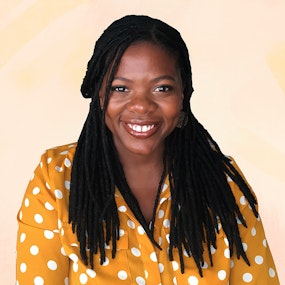
Charlotte Gray
Virtual Assistant, Graphic Designer, Writer
Charlotte is a sun-loving creative born and raised in South East London. She studied Design in Nottingham before working in the field in London, but it was during a stint working in Social Media in the Netherlands that she got the itch for working abroad. After years of dreaming what it would be like to live the laptop lifestyle, Charlotte made the move to remote work in November 2021. Since then Charlotte has worked in Barbados, UK, Maastricht and Portugal with a long list of travel destinations coming up. As she goes, Charlotte is writing about her digital nomad experiences on her travel blog shesupandaway.com.



























